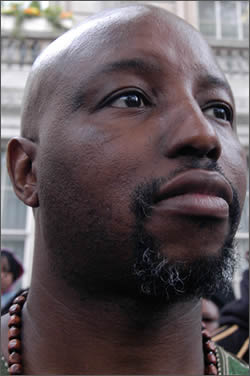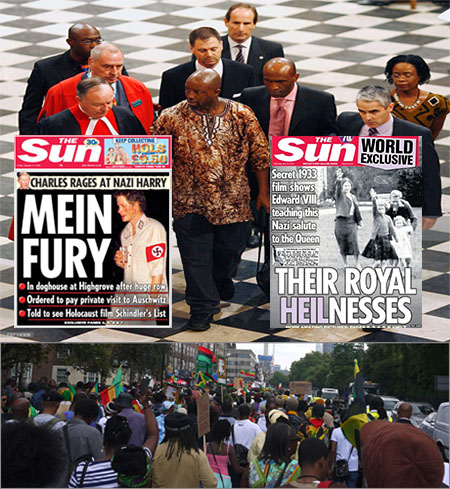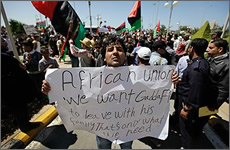Several of the suspects involved in war crime abuses committed by colonial officers serving in Kenya during the ‘mau mau’ emergency of the 1950 – 60’s have died said acting Detective Sergeant Gary Titherly of S015, the Metropolitan Police War Crimes Unit.
In a letter to the Ligali Organisation following an official complaint into police delays whilst handling the case Titherly wrote; “Since receiving your letter [to the Criminal Prosecution Service (CPS)] the War Crimes Team have commenced scoping of the named subjects… Following initial research it has been confirmed that four of the subjects are deceased. The scoping of the one remaining subject is ongoing.”
After receiving a request from Ligali on the same matter the International Criminal Court (ICC) failed to act. The ICC’s Office of the Prosecutor explained that “the Court may only exercise jurisdiction over crimes committed after the entry into force of the Rome Statute, on 1 July 2002.”
However the CPS / SO15 war crime guidelines (section A.2) on “crimes of grave breaches of the Geneva Conventions, torture or hostage taking” stipulates that the UK has ‘universal jurisdiction’.
Ligali’s list of identified perpetrators where access to relevant evidence exists of their justiciable offences included John Cowan, Second Lieutenant David Larder, Terence Gavaghan, Alan Lennox-Boyd, and Eric Griffiths-Jones.
During a high court hearing on the matter in October 2012, Justice McCombe ruled that a fair trial of these individuals was possible adding “The governments and military commanders seem to have been meticulous record keepers.”

On 20 December 2013, the Home Office replied to a Ligali complaint to Home Secretary, Theresa May about the government’s failure to act judiciously on the matter. The Government stated;
“Thank you for your e-mail of 27 November about recompense for abuses committed by British personel(sic) in Kenya between 1950 and 1963 and whether the Metropolitan Police Service will investigate such abuses.
The decision on whether to investigate is a matter for the Metropolitan Police Service and it would be inappropriate for Home Office Ministers to intervene.“
Ligali’s correspondence did not seek recompense but instead sought justice. It read;
“We are now contacting you in your capacity of Home Secretary and asking that you intervene to ensure the course of justice is not perverted. Recent and historic scandals highlighting corruption within the ranks of the Metropolitan Police has diminished our confidence in the willingness of the force to do its job whilst upholding the highest standards of moral integrity.
As a result we are asking for a progress report on the current status of our enquiry and a decision on whether the Metropolitan Police will formally investigate the very serious allegations of criminal activity we have highlighted.
As you can imagine, with historic cases such as this, time is of the essence.”
Toyin Agbetu from the Ligali organisation said
“it’s quite disingenuous of the Home Office to indicate that we as a human rights based Pan African organisation sought compensation for this matter. That is untrue. We sought, and continue to pursuit justice as an act of reparation for the numerous victims, some still alive, many now Ancestors.
We fight for those such as Susan Ciong'ombe Ngondi, one of the original claimants who passed away before the proceedings began
The crime and enduring legacy of Maafa, the horrific colonial abuse and forced enslavement of Africans during the illegal occupation of foreign territories by the British government must be formally acknowledged and face natural justice before any form of meaningful reparation and enduring reconciliation can be made.”

External Links
War Crimes/Crimes Against Humanity Referral GuidelinesThe Mau Mau settlement: Setting the record straight.Reparations Scholar-ActivistBritish colonial cover up in Mau Mau camp revealed in new secret document releaseKenyas Mau Mau uprising: Victims tell their stories
CPS to investigate British ‘mau mau’ war crimesFri 23 August 2013 CPS refer ‘mau mau’ war crime complaint to Police
In a letter to the Ligali Organisation following an official complaint into police delays whilst handling the case Titherly wrote; “Since receiving your letter [to the Criminal Prosecution Service (CPS)] the War Crimes Team have commenced scoping of the named subjects… Following initial research it has been confirmed that four of the subjects are deceased. The scoping of the one remaining subject is ongoing.”
After receiving a request from Ligali on the same matter the International Criminal Court (ICC) failed to act. The ICC’s Office of the Prosecutor explained that “the Court may only exercise jurisdiction over crimes committed after the entry into force of the Rome Statute, on 1 July 2002.”
However the CPS / SO15 war crime guidelines (section A.2) on “crimes of grave breaches of the Geneva Conventions, torture or hostage taking” stipulates that the UK has ‘universal jurisdiction’.
Ligali’s list of identified perpetrators where access to relevant evidence exists of their justiciable offences included John Cowan, Second Lieutenant David Larder, Terence Gavaghan, Alan Lennox-Boyd, and Eric Griffiths-Jones.
During a high court hearing on the matter in October 2012, Justice McCombe ruled that a fair trial of these individuals was possible adding “The governments and military commanders seem to have been meticulous record keepers.”

British War Criminals (Top): Gerald Lathbury, Ian Henderson, Terence Gavaghan, John Allen (Middle) British Army humiliate children and terrorise Africans in Operation Scaramouche
Justice as an act of reparation
On 20 December 2013, the Home Office replied to a Ligali complaint to Home Secretary, Theresa May about the government’s failure to act judiciously on the matter. The Government stated; “Thank you for your e-mail of 27 November about recompense for abuses committed by British personel(sic) in Kenya between 1950 and 1963 and whether the Metropolitan Police Service will investigate such abuses.
The decision on whether to investigate is a matter for the Metropolitan Police Service and it would be inappropriate for Home Office Ministers to intervene.“
Ligali’s correspondence did not seek recompense but instead sought justice. It read;
“We are now contacting you in your capacity of Home Secretary and asking that you intervene to ensure the course of justice is not perverted. Recent and historic scandals highlighting corruption within the ranks of the Metropolitan Police has diminished our confidence in the willingness of the force to do its job whilst upholding the highest standards of moral integrity.
As a result we are asking for a progress report on the current status of our enquiry and a decision on whether the Metropolitan Police will formally investigate the very serious allegations of criminal activity we have highlighted.
As you can imagine, with historic cases such as this, time is of the essence.”
Toyin Agbetu from the Ligali organisation said
“it’s quite disingenuous of the Home Office to indicate that we as a human rights based Pan African organisation sought compensation for this matter. That is untrue. We sought, and continue to pursuit justice as an act of reparation for the numerous victims, some still alive, many now Ancestors.
We fight for those such as Susan Ciong'ombe Ngondi, one of the original claimants who passed away before the proceedings began
The crime and enduring legacy of Maafa, the horrific colonial abuse and forced enslavement of Africans during the illegal occupation of foreign territories by the British government must be formally acknowledged and face natural justice before any form of meaningful reparation and enduring reconciliation can be made.”

Toyin Agbetu (Photo: Thabo Jaiyesimi)
External Links
War Crimes/Crimes Against Humanity Referral GuidelinesThe Mau Mau settlement: Setting the record straight.Reparations Scholar-ActivistBritish colonial cover up in Mau Mau camp revealed in new secret document releaseKenyas Mau Mau uprising: Victims tell their stories
Ligali is not responsible for the content of third party sites
CPS to investigate British ‘mau mau’ war crimesFri 23 August 2013 CPS refer ‘mau mau’ war crime complaint to Police
Speak Out!
Should the Met’s SO15 War Crimes team investigate beyond these names to identify and locate any other individuals involved in the ‘Mau Mau’ war crime abuses?Click here to speak out or read (3) comments about this article
We sought, and continue to pursuit justice as an act of reparation for the numerous victims, some still alive, many now Ancestors
Toyin Agbetu, Ligali Organisation
See Related:





Get involved and help change our world